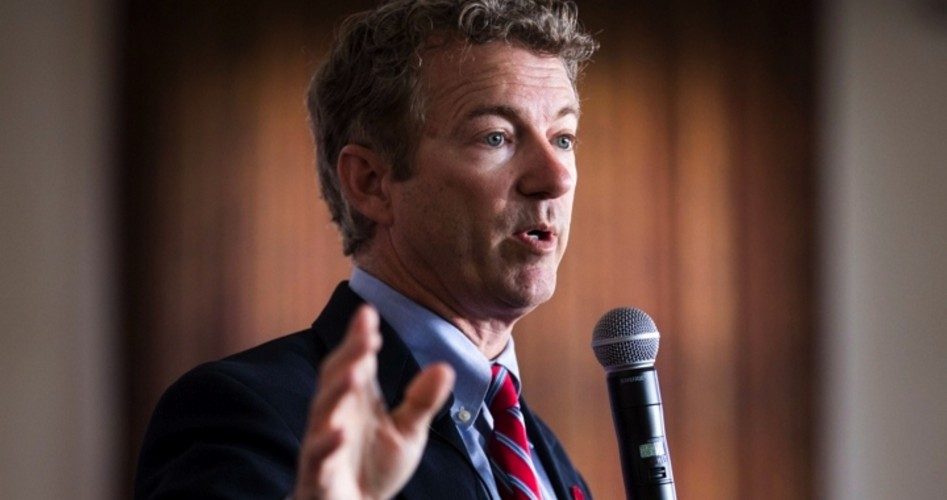
Senator Rand Paul (shown, R-Ky.) is prepared to filibuster the bipartisan budget agreement, once again pitting the first-term senator against the Republican brass.
The deal worked out by the White House and GOP congressional leadership would — as so many before it — raise the debt ceiling and prevent the United States from defaulting on debts.
In Paul’s estimation, these “compromises” are the problem, not the solution to the financial crisis.
“It is hard for me not to use profanity in describing it,” the Republican presidential hopeful said, during a campaign stop in Colorado Tuesday. “We should be using the leverage of the debt ceiling to actually enforce spending restraint.”
Paul committed furthermore to do “everything [he] can to stop it,” calling the measure a “steaming pile of legislation.”
This isn’t the senator’s first ride on the filibuster train.
He has previously conducted marathon-length attempts to block the expansion of the drone war and the unconstitutional surveillance of Americans.
The budget deal includes an $80-billion increase in defense and domestic spending over two years and it delays any additional debt ceiling wrangling until March 2017.
Although many so-called conservatives in the Senate have denounced the deal, it is widely expected that when the votes are counted, Republicans will toe the party line and the agreement will pass overwhelmingly.
Like Senator Paul, not everyone is so ready to follow orders, however.
“It’s a $1.5 trillion spending increase and in exchange for that they get $80 billion in more spending,” said Representative Tim Huelskamp (R-Kan.), as quoted in CNN. “So anybody who is a serious fiscal conservative cannot support this bill in my opinion.”
Paul echoed that sentiment in another statement to reporters on Tuesday.
According to CNN, Paul said that Senators Ted Cruz (R-Texas) and Marco Rubio (R-Fla.) “are not true fiscal conservatives because they support increased defense spending.”
“Many of them on the stage have supported spending that would’ve added to the debt,” Paul said. “I think that is irresponsible and shows them to be part of the problem, not the solution.”
Earlier this month, Paul reintroduced the Cut, Cap and Balance Act that would limit federal spending to at most 18 percent of the gross domestic product and would mandate $207 billion in budget cuts without touching Medicare, veterans’ benefits, or Social Security.
“Bold action is needed to address our nation’s debt crisis — our national debt currently stands at $18.4 trillion. We cannot keep piling debt on top of debt forever,” Paul said when he announced his bill.
What a difference a couple of weeks make.
Currently, Senator Paul is polling just above zero in national surveys of likely Republican voters. Defiance of direction from party leaders is likely one of the main causes of his low numbers.
The Republican Party could hardly stand for the person carrying its party’s banner in the presidential campaign to be on record as refusing to go along to get along.
Senator Paul’s father — former Representative Ron Paul — also ran for president and learned first hand how the GOP can play hardball to get the results it wants in primaries and conventions.
The vote on the debt ceiling deal is expected to take place within a week.
Photo: AP Images



